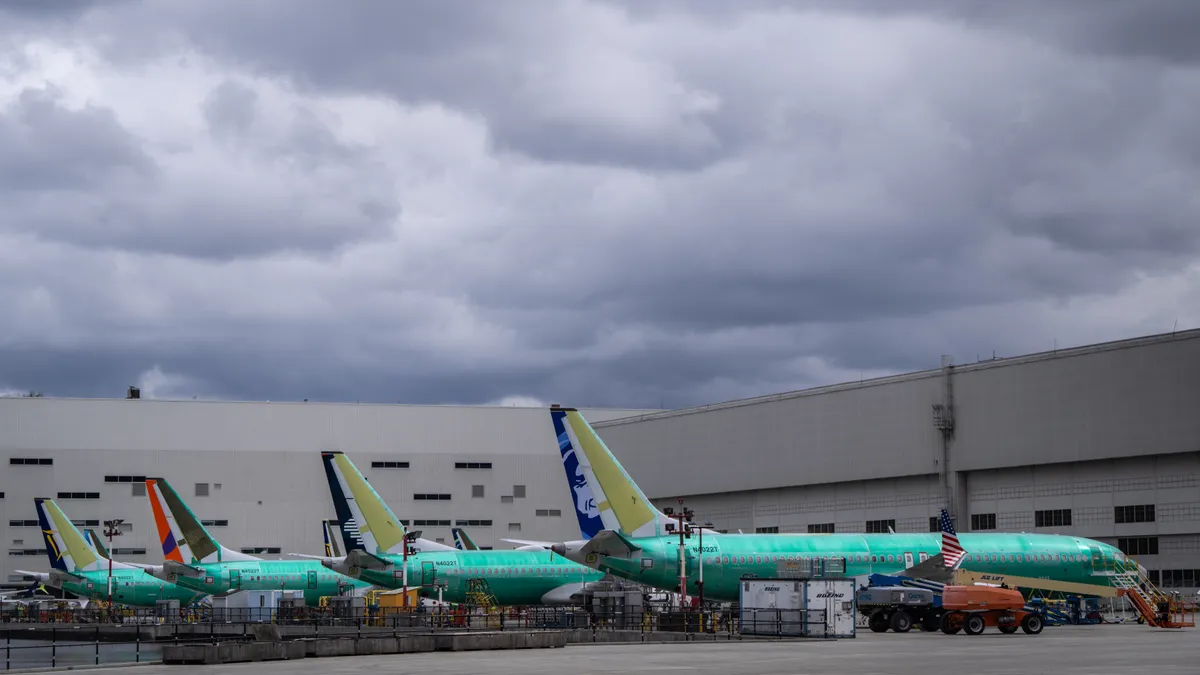Dive Brief:
- Boeing has agreed in principle to plead guilty to a charge of conspiring to defraud the U.S. related to a deferred prosecution agreement from 2021, the Justice Department said in a court filing Sunday. The plea deal represents further fallout for Boeing from the fatal crashes of two 737 Max aircraft, which killed 346 people.
- The agreement calls for Boeing to pay a $243.6 million fine and at least $455 million as “a sustained monetary investment in its compliance and safety programs” during a three-year probation period. It will also operate under an “independent compliance monitor” for three years, according to the filing.
- If convicted, Boeing would likely need to seek waivers to carry on its work for the Department of Defense and other agencies that avoid contracting with felons and what the U.S. General Services Administration labels “non-responsible contractors.”
Dive Insight:
The agreement must be approved by U.S. District Judge Reed O’Connor in Fort Worth, Texas. Numerous families of the crash victims oppose any settlement with the company and are likely to challenge the plea deal.
The government said it will file terms of the Boeing agreement with the court by July 19. Absent a plea deal, Boeing’s other option was to proceed to a criminal trial in O’Connor’s court.
“We can confirm that we have reached an agreement in principle on terms of a resolution with the Justice Department, subject to the memorialization and approval of specific terms,” a Boeing spokesperson said Monday in an email. The company referred other inquiries to the Justice Department.
The Jan. 5 failure of a door plug on an Alaska Airlines 737 Max 9 aircraft in Oregon provoked greater regulatory oversight by the Federal Aviation Administration and renewed efforts by the crash victims’ families to hold Boeing to account.
It also prompted prosecutors to investigate whether Boeing had violated the 2021 deferred prosecution agreement. In May, the government determined that Boeing had done so and was criminally liable.
The families of the crash victims had urged prosecutors to charge Boeing with additional crimes, including homicide, as part of a public trial, and have told the court that a $24 billion fine is appropriate based on the impacts to 346 families.
“The only way to get a company like Boeing to actually change is to affect its bottom line,” Erin Applebaum, a partner at Kreindler & Kreindler LLP, who is representing many of the families, told Legal Dive Monday.
The families were “disappointed that the terms were so weak,” she said. “The common theme here is that Boeing is never held accountable and never truly faces the consequences of its actions, and I’m sure this will be no different.”
Because of Boeing’s unique role as a top five contractor for the U.S. military, a key contractor in managing NASA’s International Space Station and one of only two suppliers for large commercial aircraft, its status as a felon isn’t likely to carry practical impacts.
The government will almost certainly grant Boeing waivers for national security reasons, Applebaum said, adding that she supports that outcome. Investors also did not appear concerned about the effects of a Boeing guilty plea, with company shares rising about 0.5% on Monday.
The Defense Department “will assess the company’s remediation plans and agreement with the Department of Justice to make a determination as to what steps are necessary and appropriate to protect the Federal Government, in accordance with the Federal Acquisition Regulation (FAR) and the Defense Federal Acquisition Regulation Supplement (DFARS),” a department spokesman, Jeff Jurgensen, said in an email.
Boeing has said it is revamping its safety culture and empowering engineers to promote greater manufacturing quality on its 737 and 787 assembly lines. Those two models account for the bulk of the aerospace giant’s revenues. Boeing also announced last week that it would acquire a key supplier, Spirit AeroSystems, for $4.7 billion in a bid to improve reliability. Boeing had spun off the company, which makes 737 fuselages, wings and other aircraft parts, in 2005.
Chief Executive David Calhoun plans to step aside at the end of the year, and two other top leaders – Chairman Larry Kellner and Stan Deal, the president of Boeing Commercial Airplanes – left the company earlier this year.











